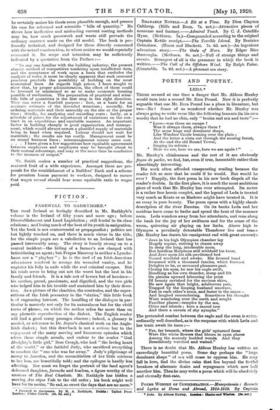FICTION.
FAREWELL TO GARRYMORE.*
THE rural Ireland so lovingly described in Mr. Ra,thkyle's volume is the Ireland of fifty years and more ago ; before Disestablishment and Land Legislation ; still feudal in its class relations ; and losing much of the best of its youth in emigration. Yet the book is not controversial or propagandist ; politics are but lightly touched on, and there is much virtue in the title, for the simple pages are a valediction to an Ireland that has passed irrevocably away. The story is loosely strung on to a central incident—the hiding of a farmer's son charged with Intimidating an agent; but Fergus Macevoy is neither a Lynche- haun nor a " playboy " ; he is the tool of an Irish-American adventurer resolved to avenge his wounded vanity, and he expiates his folly in exile while the real criminal escapes. But his trials serve to bring out not the worst but the best in his family and friends. It is a tale not of heroes but of heroines— his mother, proud, passionate, and dignified, and the two girls who helped him in his trouble and sustained him by their devo- tion. As a picture of the charities, the courtesies, and the super- stitions of the Irish peasantry in the "sixties," this little book Is of engrossing interest. The handling of the dialogue in par- ticular is masterly not only for its naturalness but for the vivid turns of phrase, on which the author relies far more than on any phonetic reproduction of the dialect. The English reader will find a good many passages obscure ; indeed, a glossary is needed, or reference to Dr. Joyce's classical work on the Anglo- Irish dialect ; but this drawback is not a serious bar to the enjoyment of the many moving and humorous episodes which adorn these simple annals, and endear to the reader "God Almighty's little girl," Bess Creagh, who had "the loving heart of the world," or the faithful Judy, who sacrificed everything to comfort the "one who was far away." Judy's pilgrimage of mercy to America, and the reconciliation of her little mistress to her loss, are beautifully told; and the epilogue is hardly less affecting. Nor must we forget the portrait of the land agent's deformed daughter, farovehe and fearless, a figure worthy of the creators of The Beal Charlotte. Mr. Rathkyle has bidden a moving Ave atque Vale to the old order ; his book might well have for its motto, "So sad, so sweet the days that are no more."
• Parma to oarryowv. By London Fisher Unwin. M. ad. H. A. Batbkyle. Dublin : Talbot Press net.]










































 Previous page
Previous page